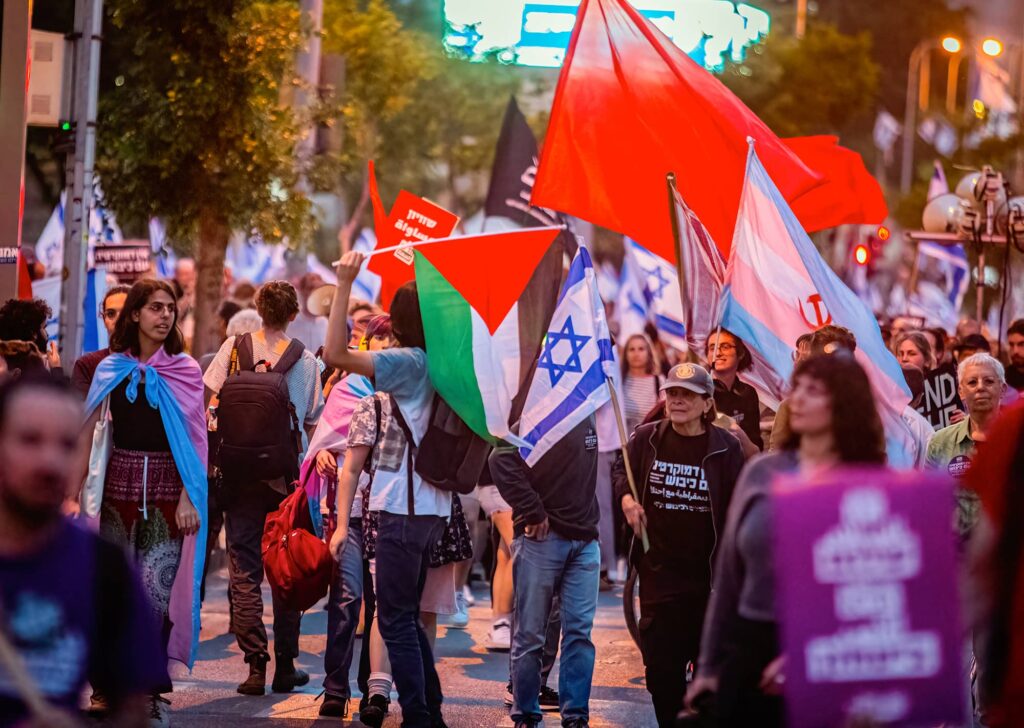Since the terrible events of October 7th, some Israelis claim there is no longer any distinction between left and right – Israelis were massacred regardless of political affiliations. At the same time, around the world there is an increasingly binary view of political identity, which claims that a person can be either a Zionist or a progressive but not both.
This binary approach is intensifying. At the same time, too few people feel empathy with both Israeli and Palestinian victims of the current war. Therefore, I would like to explain why I define myself as someone with a left universal worldview and a Zionist particular worldview. The two can and should live together without any contradiction.
These are the two main pillars of my identity.
Left as a universal concept, which in contemporary political terminology means liberalism, but which is not satisfied with existing freedoms and rather strives to increase and improve equality in areas such as rights of minorities, women and LGBTQ+ people, environmental protection and more. In Europe it is often synonymous with social democracy and in the US with progressivism.
Zionism as a particularistic view, which believes that the State of Israel is the national homeland both for Jews who want to live in Israel and for those who do not want to do so, in addition to being a possible place of refuge when and if the need arises. It also provides a focus for identification on the basis of a common cultural origin.
I am a Zionist who believes wholeheartedly in the universal democratic values expressed in Israel’s Declaration of Independence, first and foremost among them being equality between all citizens of the state, Jews and non-Jews alike.
Many liberal friends argue that I should avoid defining myself as “progressive” and settle for “liberal” because progressives have recently developed a reputation for extreme identity politics. It is true that on the margins of the progressive movement are some with no understanding of the Jewish past and present who view Jews as white privileged people.
Palestinian friends, among others, argue that it would be better if I gave up Zionism which, for them, is an ultranationalist and colonialist worldview. They base their views of Zionism on the interpretations of Israeli right-wing parties that distort the vision of the founders of the state. Sometimes this is how Zionism seems from the outside.
I am a peace activist but not a pacifist. Some progressives believe that “might can never be right.” But Israel should always be strong and I am proud of my service in the Israel Defense Forces and of my children’s service. However, I oppose Israel’s too frequent resort to military force without strategic purpose and without understanding the limits of military actions’ effectiveness as a tool to achieving strategic goals.
What I mean by “Progressive”
Describing myself as “progressive” allows me to place myself on the liberal spectrum more specifically. After all, libertarians also define themselves as liberals because they sanctify freedom and individualism, but they are not bothered by social gaps and the fact that free market “social Darwinism” leaves many behind.
A progressive worldview sanctifies not only liberty but also greater equality and a balance between equality and freedom. We are not satisfied with a free market (although it is necessary and without it, entrepreneurship cannot be encouraged), because we believe that there are cases in which the free market results in monopoly, market failure and concentration of wealth into the hands of a few oligarchs. We believe that in such cases, it is the duty of the state to intervene and rectify.
Progressives believe in the government’s role in supporting disadvantaged groups and creating equal opportunities. Without the social-progressive worldview and its practical manifestations, for example through affirmative action in the United States, women and black people would have no right to vote and black people would still be segregated and would not have attained the positions of president and presidential candidate in the United States.
Liberal Judaism is essentially progressive because it places the concept of tikkun olam [repairing the world] at the center of its aspirations, a mindset inherent in progressiveness that strives forward to continual improvement, not satisfied with the status quo. Without it, Israel would not be the “Start-Up Nation” and there would not be so many Jewish Nobel Prize winners.
A recent example of the differences between liberals and progressives in Israel can be seen in the protest movement of both groups against the government’s judicial reform proposals of 2023. Both liberals and progressives believed the government’s plan would restrict judicial independence and undermine democratic rights. Many of my liberal partners in the protests narrowly focused on preventing the government’s plan, without considering the connection between this struggle for democracy and the struggle against Israel’s occupation of the West Bank.
In my view, bolstering the West Bank occupation was a significant motive for the government’s judicial plan, since it would degrade the judicial checks on executive action. Therefore, a real struggle against the government’s judicial plan must go hand in hand with the struggle against the occupation and must include the Palestinian citizens of Israel. Nevertheless, it is important for me to note that I will cooperate with the demonstrators who do not think like me on this and other issues.

What I mean by “Zionist”
The Zionist component of my worldview stems from a complete belief in the right of the Jewish people to a state of its own, as a refuge for a people that has been persecuted for many generations. The Jewish people are a nation and a culture but not necessarily a religious one. In my view, the issue of religion is personal and communal, not a matter for the state.
I feel very Jewish but I am an agnostic secularist, willing to fight for the right of religious people to practice their religion and way of life and at the same time for the right of secular people to avoid religious coercion. Zionism in its origins is secular and progressive in nature – it aspired to build here a model society of justice, equality and freedom, not a theocracy or an ethnocracy.
I deeply oppose the claim that Zionism is a colonialist movement. The historical and national connection of the Jewish people to the Land of Israel is undeniable. The self-definition of the Jewish people within the boundaries of its own state in the Land of Israel was radically different from that of European colonialists in Africa and America, who created regimes based on economic exploitation, often along with imposing religion on indigenous peoples.
Indeed, Zionism created a national home for the Jewish people. But without a national home for the Palestinian people, we will not be free in our land. For exactly the same reason that I am a Zionist, I support the rights of the Palestinians to a state of their own. I believe that without political separation between the peoples and without national rights of the Palestinian people living in the West Bank and Gaza, we in Israel will not be able to maintain a democratic and just society.
Hence the two-state vision, which will ensure security through long-term arrangements, is the path that connects Zionism with the progressive approach. It is a vision that on the one hand will realize the right of the Jewish people to a state of our own and on the other hand, will not be at the expense of the Palestinians’ right to a nation-state. In short, if we don’t end the West Bank occupation, it will end us.
Maintaining a liberal democracy in Israel requires a nation-state framework. But there is a dramatic difference between nationalism and ultranationalism. Ultranationalism is ethnocentric in nature, based on hatred of the other and on a sense of racial or ethnic superiority. This is in contrast to nationalism, which is based on solidarity with your people, which is as natural as solidarity with your family. Unfortunately, there are too many in Israel today who perceive Zionism in ultranationalistic terms and not as a national liberation movement, as it was originally.
From my identity as a Zionist and a progressive, I believe that the State of Israel must be a liberal democracy that cares about equality and a society that does not slide into unregulated capitalism but rather encourages mutual responsibility and true solidarity between all the sectors. Israel must be a peace-loving state that works towards political separation from the Palestinians in the West Bank, East Jerusalem and Gaza and whose duty is to stop denying them (and us) the prospect of a sovereign state of their own.
I believe that the Israelis will eventually become disillusioned with the dangerous wave of ultranationalism sweeping over it and that it will return to being what its founders hoped for – a safe haven for the Jewish people and a model society for all its citizens. But the two-thousand-year-old hope is not enough, and we must work hard to realize it.
We must fight an all-out war against racism. I do not distinguish between antisemites and Islamophobes or other racists; anyone who fights antisemitism without fighting against racism caused by Jews is not an ally in the vision of the Zionist left.
In order to achieve this vision, we must create a healthy balance between majority rule and protection of minority rights, ensure separation of religion and state, and negotiate a recognized border between us and our Palestinian neighbors.
As both a Zionist and a progressive, I will work to advance these goals with everyone I can, including those not on the left, non-progressive liberals, and non-Zionists. The only ones I won’t cooperate with are racists of all kinds.

